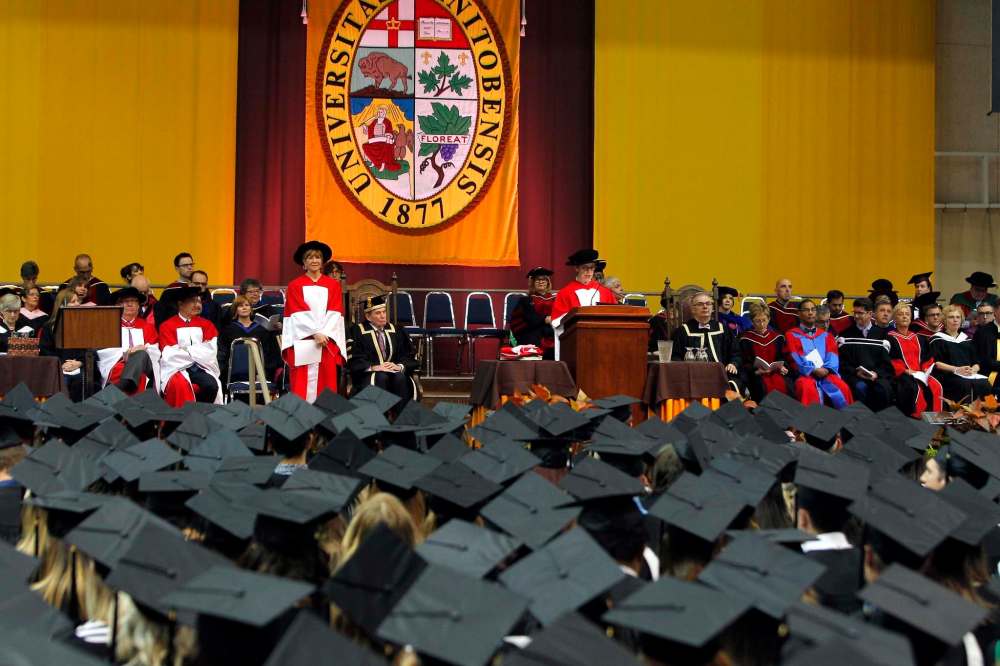Tories doff the cap; post-secondary tuition can go up by 5% plus inflation
Advertisement
Read this article for free:
or
Already have an account? Log in here »
To continue reading, please subscribe:
Monthly Digital Subscription
$0 for the first 4 weeks*
- Enjoy unlimited reading on winnipegfreepress.com
- Read the E-Edition, our digital replica newspaper
- Access News Break, our award-winning app
- Play interactive puzzles
*No charge for 4 weeks then price increases to the regular rate of $19.00 plus GST every four weeks. Offer available to new and qualified returning subscribers only. Cancel any time.
Monthly Digital Subscription
$4.75/week*
- Enjoy unlimited reading on winnipegfreepress.com
- Read the E-Edition, our digital replica newspaper
- Access News Break, our award-winning app
- Play interactive puzzles
*Billed as $19 plus GST every four weeks. Cancel any time.
To continue reading, please subscribe:
Add Free Press access to your Brandon Sun subscription for only an additional
$1 for the first 4 weeks*
*Your next subscription payment will increase by $1.00 and you will be charged $16.99 plus GST for four weeks. After four weeks, your payment will increase to $23.99 plus GST every four weeks.
Read unlimited articles for free today:
or
Already have an account? Log in here »
Hey there, time traveller!
This article was published 20/03/2017 (3198 days ago), so information in it may no longer be current.
Post-secondary undergraduate tuition for domestic students will be allowed to go up by five per cent plus the rate of inflation beginning in the 2018-19 academic year, Education Minister Ian Wishart announced Monday.
The bill tabled for first reading removes the cap imposed by the former NDP government that held tuition increases to the inflation rate.
“The five per cent we think is a very modest increase,” Wishart said. “I don’t believe enrolment rates will go down at all.”

Manitoba has had Canada’s third-lowest tuition — behind only Newfoundland and Labrador and Quebec — for many years. Wishart said Manitoba tuition would remain lowest in Western Canada; the bill lets him claw back operating grants if Manitoba ever exceeds the western Canadian average.
Combined with operating-grant increases that have been in the 2.5-per-cent range, the province’s universities say they’ve been struggling to maintain the status quo, let alone add jobs, programs and services.
Wishart said that the new limit does not apply to graduate student fees or to the surcharges on international students.
The bill removes restrictions on course-related fees, but Wishart expects those to be levied at a cost-recovery rate. When tuition was lower, he said, “They would find anything possible to load onto a course fee.”
Wishart will set college tuition rates through regulation, based on a western Canadian average.
In an email, U of M president David Barnard said the university is currently $2,000 a year behind the University of Saskatchewan. Had Manitoba been on par, “those additional funds would enable the university to provide access to more students with financial challenges through improved scholarships and bursaries, and at the same time enhance programming and facilities to meet ever-evolving student needs.”
nick.martin@freepress.mb.ca

Nick Martin
Former Free Press reporter Nick Martin, who wrote the monthly suspense column in the books section and was prolific in his standalone reviews of mystery/thriller novels, died Oct. 15 at age 77 while on holiday in Edinburgh, Scotland.
Our newsroom depends on a growing audience of readers to power our journalism. If you are not a paid reader, please consider becoming a subscriber.
Our newsroom depends on its audience of readers to power our journalism. Thank you for your support.
History
Updated on Monday, March 20, 2017 4:43 PM CDT: writethrough






